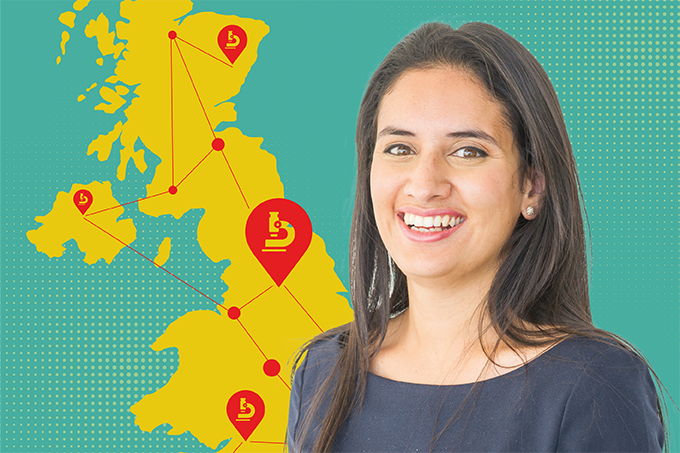
The National Pathology Imaging Cooperative (NPIC), based in Leeds, UK, has an ambitious remit – to develop and roll out a fully connected digital pathology system across the National Health System (NHS) network. And the person charged with ensuring it all happens to time and budget is Daljeet Bansal.
In part three of our NPIC deep dive, we spoke with Operations Director Bansal about her role in leading research and AI.
What does your role as NPIC Operations Director involve?
I oversee research and AI operations from business planning to strategic partnerships, and I’m the lead contact for all the collaborators, academics, and researchers that we work with.
When I joined NPIC, over five years ago, I was responsible for operations; I now oversee the research team, consisting of project managers, biomedical scientists, and AI experts. NPIC’s research offering includes AI development and evaluation, and AI FORGE.
What is your background, and how did that lead you to the NPIC program?
My PhD was in neuroscience and nerve injury repair, followed by a postdoc in spinal cord injury models. I’ve always been interested in imaging and healthcare technologies – from early research and development to looking at ways new products are deployed and adopted by the NHS, and overcoming hurdles such as funding or regulatory issues.
I’ve worked for the NHS for over a decade, in research project management roles. Prior to NPIC, I led a national program funded by the National Institute for Health and Care Research focused on medical devices research and usability studies and looking at adoption trends across the NHS.
At that time, AI was emerging in software for medical devices. I was aware that Leeds Teaching Hospital was also looking at AI, in relation to digital pathology systems – and what better way to work with the team than to join it?
What sort of research projects is NPIC involved in?
We have been fortunate to procure many different slide scanners for research that are housed together in one environment. This unique scanning facility allows us to offer a slide scanning service to researchers or industry, using multiple scanners for replication studies or if multiple data sets are required. One of the flagship projects is in collaboration with Genomics England for the 100,000 Genomes Project – scanning and digitizing up to 300,000 slides.
That capability also allows us to work closely with some of the companies in the systems development space, particularly with regards to regulatory considerations. For example, an AI product can be trained on more than one scanning platform and we can facilitate validation using a range of scanners.
We can also facilitate research data access requests for digital images and pathology reports across different clinical specialties. That requires appropriate anonymization, consent, and controls, and our patient advisory group has some oversight of that process.
Additionally, our network of connected pathology departments lends itself perfectly to multisite research studies. We can recruit the sites, provide the standardized paperwork templates, and grant access to data, using a centralized system approach.
How far along are you with development of AI capability for the NPIC system?
We’re involved with development of commercially available AI products. Many are in early stages of development, in response to a use case or unmet clinical need. So, at a single site level, we get involved in AI development, product testing, and providing feedback to inform product development and upgrades. Multisite development requires funding, and we can help with funding bids to enable that and facilitate AI evaluation.
We are currently evaluating AI products in one specialty, and we're essentially looking to move that methodology into other specialties. NPIC will become a unique UK-based testbed for the evaluation of AI. That will allow us to provide formalized, independent product evaluations to the NHS.
For products that are closer to market, we can facilitate usability studies by utilizing our dedicated testing space as well as involving pathologists and laboratory medicine professionals in our network.
What do you find personally rewarding about the NPIC program?
Primarily, for me, it’s the teamwork. We started off with just a handful of us working on the program and grew to the current team of almost 40 people. Typically, large organizations can be quite hierarchical, but I don’t get that sense here. Everyone is genuinely working on this program to achieve the shared vision and deliver benefits for patients.
I personally find satisfaction from seeing new technologies transform from bench to bedside. And, because we have a close working relationship with the users and with our public and patient advisory group, and will invite their early input and advice, they essentially get to co-design and co-lead some of those research opportunities and transformations.
To actually have a parallel regional and national program is quite unique, and to make the national ambition program a reality is very satisfying. It also includes us digitizing and supporting the research and aspirations across all clinical specialties locally, regionally, and nationally – for the National Paediatric Network. Those efforts are led by Great Ormond Street Hospital, and also the National Sarcoma Network led by the Royal National Orthopaedic Hospital.
Overall, NPIC has provided the use case for digitizing clinically, as well as the platform research. At NPIC we have established that network effect and will continue to scale the program.




